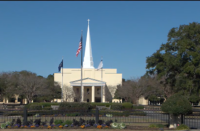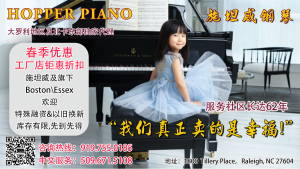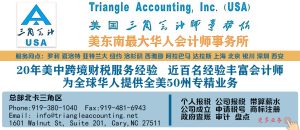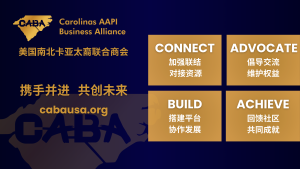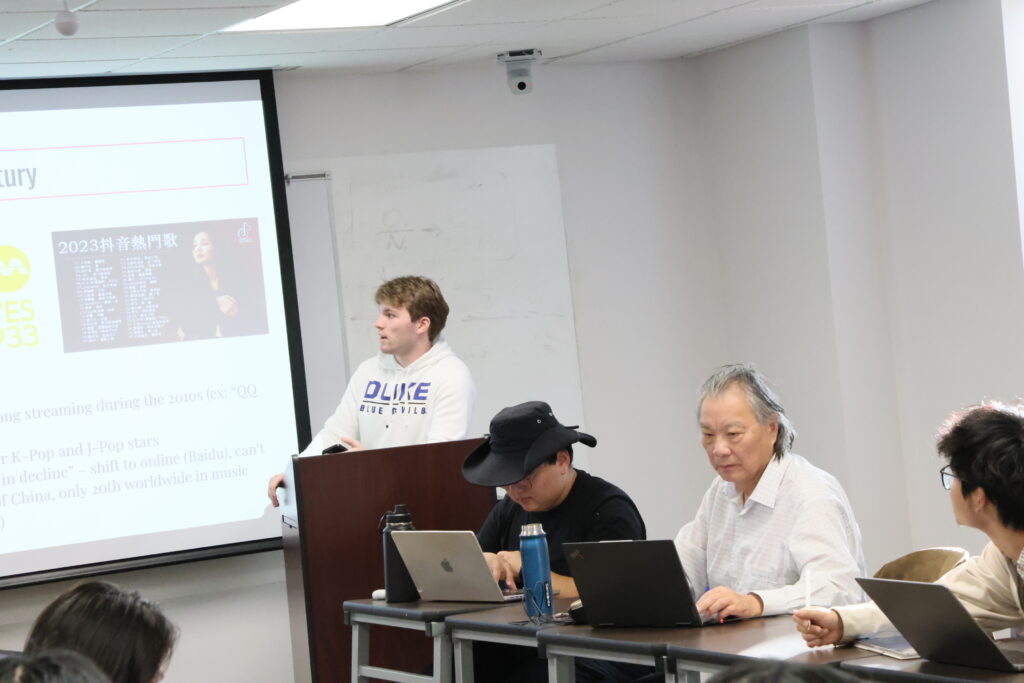
【华e生活毛苌子报道】每个周一下午,是杜克大学刘康教授每周授课的时间,不同的是,11月12日这天,课堂里来了一位高中10年级学生——凯瑞Green Hope高中10年级的慎奥锐。
卡着快上课的时间找到教室,先听课。这是刘教授本学期开设的“当代中国传媒与大众文化”。两位男生走上讲台,面对和十几位学生坐在一起的老师,一位负责播放PPT,另一位男生主讲,介绍的是他们搜集整理的关于“中国流行音乐”的前生今世。
他们用PPT,系统展示了从上世纪20年代开始发端的中国流行音乐,从风靡一时的明星周璇,后来成为中华人民共和国国歌的《义勇军进行曲》,台湾流行天后邓丽君,香港四大天王,到当下的“抖音十大金曲”。
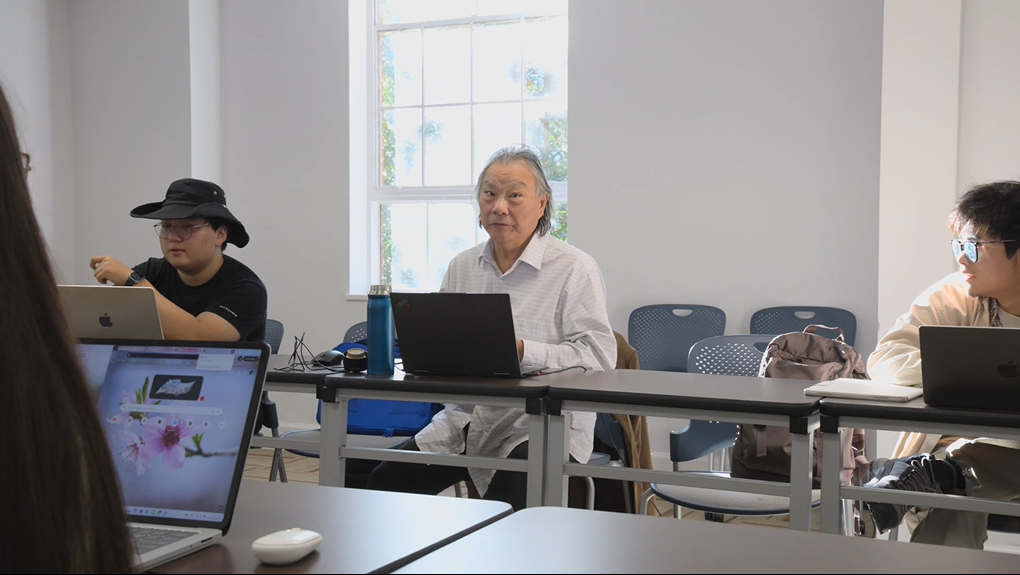
刘康教授在学生讲述过程中,随时打断,就某个问题进行讨论、延展或分享有关的逸闻趣事。比如,谈到香港的粤语歌曲,他推荐学生们听听黄家驹担任主唱的乐队Beyond创作的两首经典,其中《光辉岁月》曾在曼德拉逝世的追悼大会上唱响过。
两个学生的主题分享,大半时间是刘康教授在讲。结束后,离下一堂课““中国现代文化:国内外叙事”有大约20分钟的空隙,他饶有兴趣向慎奥锐介绍他的教学内容和形式。
将学生分成若干个小组,每个小组就某个主题自己去搜集资料、讨论研究,轮流做分享会。慎奥锐来旁听的这次是“流行音乐”,如果是下一周来,听到的将是另一组分享中国的建筑艺术。
1996年因合著《妖魔化中国的背后》畅销声明远播的刘康教授,同时在杜克大学和杜克昆山大学执教。此前,他还在上海交通大学任教接近6年之久。
慎奥锐对刘康教授谈及的中美课堂的不同尤其感兴趣。
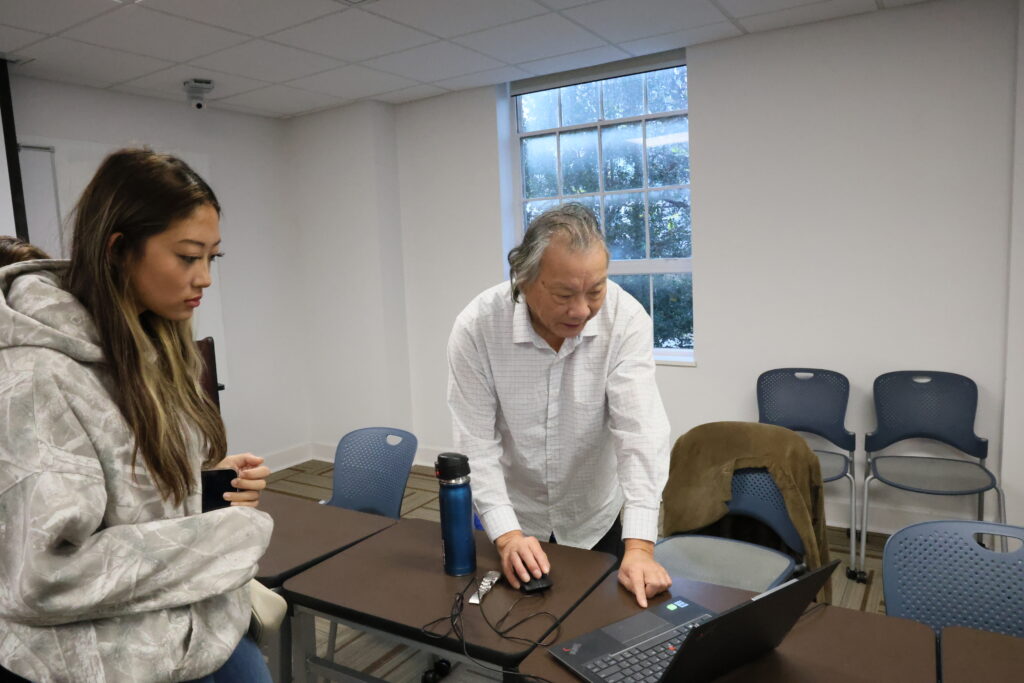
观点:美国正在变得“忘记了自己”
【华e生活】青少年记者 慎奥锐 凯瑞Green Hope 高中10年级学生
杜克大学当代中国媒体与流行文化教授刘康因其课堂设计方式而与众不同。在他的一堂课上,他会让一组学生站在教室前方,展示他们被指定的主题,而他自己则坐在学生中间,成为一名听众。在通常不会超过十分钟、总共不到十张幻灯片的展示过程中,他会不时插话评论或提问。他像火花点燃火焰一样,激发学生间的辩论和参与。
课堂上,他与学生之间的丰富的讨论和热烈的辩论让时间飞逝。
当被问及中美课堂的主要区别时,刘教授指出,中国学生通常会反驳他的评论或提问更加紧张,可能是因为对这种课堂形式不够熟悉。相比之下,他发现美国学生更乐于参与讨论,甚至对教授的观点提出异议。
在我看来,这种现象严重地表现了一个国家的教育体系与政治或文化态度之间的关系。中国学生似乎更注重诸如顺从与服从之类的价值观,因此他们往往对顶老师的冲突感到羞愧,或者表达不同的观点。而美国则强调个体主义和面对枪支焦点的重视,即使是这样的权威人物,学生们也习惯于将讨论视为一种推动进步的建设性实践。
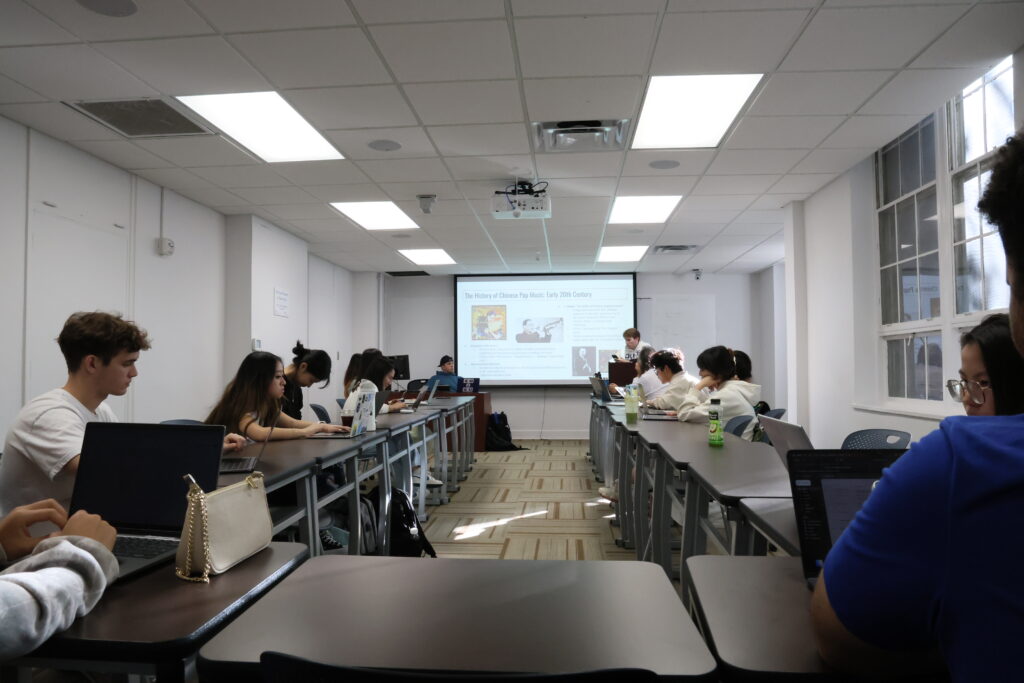
对我来说,美国作为一个国家的真正价值体现在人民的多样性中。美国的建立,源于那些追求改变、寻求个人成长空间的人,而不是为了成为一个庞大的机器的一部分。这正是这种内部的多样性,为美国成为世界强国奠定了基础。然而,近年来,政治最强,以及由差异引发的仇恨价值不断增长,那些曾经构成我们的差异,反而分裂了我们的根源。
我们的种族、宗教、国籍和身份等差异,正是让美国赢得“世界熔炉”这一美誉的原因。 作为一个国家,美国的身份源自其独特而多样的人民,这些人带来了新的思想、习俗、信仰和影响。然而,正是这些封闭,阻碍了美国实现其最大的潜力。作为人类,我们固执地认为自己的方式才是唯一正确的,因此通常都是相反的观点。结果是,尽管我们拥有丰富的多样性,但缺乏这种多样性的多样性。这一点是我们需要共同努力改善的地方。
康教授在课堂上的观察,代表了美国超越的地方,美国培养了有能力、有智慧、有勇气以文明的方式提出不同意见的年轻人。也许我们都能从他的学生身上学到一些东西。学会透过仇恨的丑陋外壳,看到宽容和愿意进行富有成效的讨论这颗珍珠。只有这样,我们才能作为国家的人民向前迈进。
Opinion: The United States is forgetting its identity
By Elizabeth Shen, 10th Grade, Green Hope High School
Duke Professor of Contemporary Chinese Media and Popular Culture, Liu Kang stands apart because of the way he structures his classes. During the duration of one of his lessons, he has a set of students stand at the front of the classroom to present their designated topic. He sits amongst the rest of the students, a listener. Throughout the presentation that would have normally lasted no longer than ten minutes, a total of less than a dozen slides, he interjects with comments or questions. He acts as a spark to a fire, promoting debate and engagement within his students.
Time flies, facilitated by the rich discussions and avid debates that take place between his students and himself.
Professor Kang, when asked, identifies one key difference between his classes in America, in comparison to China. He explains how Chinese students are often more hesitant to provide contrary responses to his comments or interjections, most likely unaccustomed to the structure of his classes. In comparison, students in America, he’s noticed, are eager to engage in discussion, including those in disagreement to the professor’s own comments or judgements.
This is, to me, an interesting display of the relationship between a country’s education system, and political or cultural attitudes. Chinese students seemed to prioritize values such as conformity and obedience. In turn, they are shy to talk back to the teacher, or offer differing perspectives. In contrast, America places emphasis on individualism and the value of differences in perspective, even against an authority figure such as a teacher. Students appear to be used to viewing discourse as a productive practice that fuels progress.
To me, what comprises the very value of the United States as a nation is the differences amongst the people. It was founded from people searching for change and space to thrive as individuals as opposed to a piece of a larger machine. The diversity within our country is what has laid the framework to propelling us onto the world stage as one of the most powerful countries. Through the past years, there has been a growing trend towards increased political polarization and hatred towards one another because of the very differences that once gave us value.
Our differences in race, religion, nationality, and identity among others is precisely what earned America the nickname of the world’s melting pot. As a country, the United States is given an identity from its unique and diverse people, who bring new ideas, customs, beliefs, and influence to the table.
However, it is these very cleavages that handicap this country from succeeding to its fullest potential. As humans, we hold the stubborn assertion that our way is the right way, and often reject opposing viewpoints. As a result, while abundant with diversity, we are starved for tolerance of such differences. And it is here that we must all work to improve.
Professor Kang’s observations from teaching his class are a representation of where America exceeds, with the fostering of youth that are capable, intelligent, and brave enough to provide dissenting opinions in a civilized manner. Perhaps we could all learn something from his students. To learn to look past the ugly shell of hate to the pearl that is tolerance and a willingness for productive discussion. Only then, can we move forward as people of the nation.

